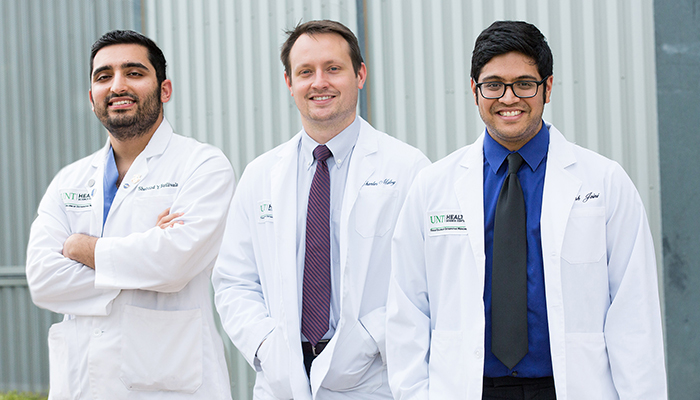Research projects help medical students become better physicians
By Jan Jarvis

As a second-year TCOM student, Charles Maloy has no doubt that doing research now will make him a better physician later.
“Research has a way of making you think creatively and keep looking for answers when you are trying to solve a problem,” Maloy said. “I feel like having a research background will make me a wiser, well-rounded physician.”
Each year between 70 and 85 TCOM students discover that working on a research project has many rewards, said Peggy Smith-Barbaro, PhD, Assistant Dean of Research.
“We firmly believe that doing research as a medical student makes better doctors,” she said. “It also helps them become informed consumers of medical research.”
The rewards start in medical school and continue over a lifetime.
Five to 10 medical students are selected to give presentations at national events every year, said Michael Smith, PhD, Year 1 Curriculum Director and Professor in the Institute for Cardiovascular and Metabolic Diseases. Typically, about 80 percent or more of the medical students who participate in research present posters at Research Appreciation Day.
“The bottom line is these medical students learn how to carry out research,” he said. “They learn skills such as how to think analytically, which will help them in the long run as a physician.”
Second-year student Parish Jaini, who received a travel award to attend the Federation of American Societies of Experimental Biology annual meeting, said he already sees the impact that research has had on him.
“When I read a research paper now, I have a much better understanding of what it says,” he said. “Now I can more easily evaluate the strengths and weaknesses in the paper.”
Maloy, who has spent more than a year researching how hypertension can be combatted, said the project has helped him better understand other studies.
“It gives you an eye for what is important and what is not when reading a paper,” he said.
Students have numerous opportunities to conduct elective hands-on research program under the direction of a mentor. Between 70 and 90 percent of students in the top 10 percent of each class accept a slot in the Honors Research Elective Practicum. Others opt for the Pediatric Research Program or elective projects.
Shehzad Batliwala found that working with a mentor in the Honors Research Elective Practicum was very rewarding. His research focused on the damage that is done to the body when CPR or electric shock is used to revive someone.
Although he has decided against going into cardiology, he said the experience will benefit him in the long-run.
“Even if I don’t go into the same field that I did research in, it still shows my dedication to lifelong learning,” he said. “I believe research in general show a commitment to academic medicine.”
Doing a research project also helps student build an academic track record that improves their chances of matching with their first choice residency program, Dr. Smith-Barbaro said. In highly competitive residency programs such as dermatology and ophthalmology, research experience can be a real asset.
Jaini said that the research he did on the effect that aspirin has on hypertension and maternal vascular function during pregnancy, was especially meaningful because it could be translated into the clinical setting.
“The research was in line with what I want to do as a physician,” he said. “I imagine that one day I will run into a lot of patients that have hypertension.”




Social media